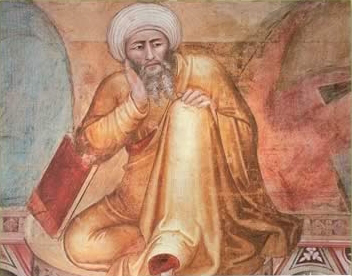The views expressed in our content reflect individual perspectives and do not represent the authoritative views of the Baha'i Faith.
Scientific inquiry tells us that everything has degrees – that all things are relative.
You can summarize this scientific view of the world with one phrase: No black or white, only shades of grey. The phrase reflects the view that no absolute right or wrong exists in our morally imperfect world – that there are no moral absolutes.

Ibn Sina (Avicenna)
In the debate over the existence of God, this question of moral relativity has taken center stage for the past thousand years or so.
But it all began much earlier than that, with Aristotle in his Metaphysics, sometime around 300 BC. Aristotle’s view of the world and of God had an enormous impact on all of western philosophy and on major early Islamic thinkers like Al-Kindi, Al-Farabi, Ibn Sina (Avicenna) and Ibn Rushd (Averroës), through the Falsafa (philosophy) school of Islamic thought. These great thinkers in turn influenced St. Thomas Aquinas and his famous essay called “Five Proofs of God,” controversial when it appeared in his 13th Century book Summa Theologica and still causing debate today.
Aquinas believed that faith alone could not suffice us – that human beings needed to use reason to grasp the truth about God. In his Five Ways (Quinque Viae) from Summa Theologica he lists those reasons:
- Motion; and the idea of a First Mover.
- Causation; and the idea of a First Cause. (which we’ll return to in another essay)
- The existence of the necessary and the unnecessary.
- Gradation; or the idea of shades of grey.
- Order in nature; or all nature is compelled by God toward an end.
Here’s a direct quote from the Fourth Proof of the Aquinas argument:
For there is discovered greater and lesser degrees of goodness, truth, nobility, and others. But “more” or “less” are terms spoken concerning various things that approach in diverse manners toward something that is the “greatest,” just as in the case of “hotter” approaching nearer the “greatest” heat. There exists, therefore, something “truest,” and “best,” and “noblest,” which, in consequence, is the “greatest” being. For those things which are the greatest truths are the greatest beings…. Furthermore, that which is the greatest in its way, is, in another way, the cause of all things belonging to it; thus fire, which is the greatest heat, is the cause of all heat, as is said in the same book. Therefore, there exists something that is the cause of the existence of all things, and of goodness, and of every perfection whatever. We call this “God.”

Ibn Rushd (Averroes)
In other words, if I may take the liberty of simplifying and summarizing this subtle and serious argument, Aquinas says that shades of grey are only made possible by the existence of black and white. Or, in a better way to put it, that you can deduce the existence of God from the existence of human moral good.
This means that a moral universe, according to Aquinas in his first principle, can only originate from a First or Prime Mover; a being that sets the entire concept of morality itself in motion. What Aristotle called the unmoved mover, this concept of God as the prime mover of the universe has influenced theology and philosophy for thousands of years. Scientifically, this matches well with the much more recently-discovered law of the conservation of energy, the principle of physics which states that the total energy of a system cannot change.
Baha’u’llah refers to the concept this way:
Glorified, immensely glorified art Thou! Thou art He Who from everlasting hath been the King of the entire creation and its Prime Mover, and Thou wilt to everlasting remain the Lord of all created things and their Ordainer. – Baha’i Prayers, p. 41.
Baha’is believe that both the theological and the scientific view equally validate the existence of God:
…it is understood from the man who is sick that there must be one who is in health; for if there were no health, his sickness could not be proved. Therefore, it becomes evident that there is an Eternal Almighty One, Who is the possessor of all perfections, because unless He possessed all perfections He would be like His creation.
Throughout the world of existence it is the same; the smallest created thing proves that there is a creator. For instance, this piece of bread proves that it has a maker.
Praise be to God! the least change produced in the form of the smallest thing proves the existence of a creator: then can this great universe, which is endless, be self-created and come into existence from the action of matter and the elements? How self-evidently wrong is such a supposition! – Abdu’l-Baha, Some Answered Questions, p. 6.
















Comments
Sign in or create an account
Continue with Googleor